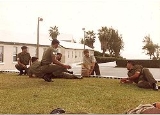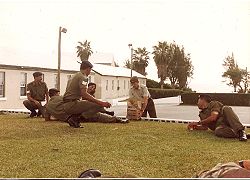
Permanent Staff Instructor
Encyclopedia

Warrant Officer
A warrant officer is an officer in a military organization who is designated an officer by a warrant, as distinguished from a commissioned officer who is designated an officer by a commission, or from non-commissioned officer who is designated an officer by virtue of seniority.The rank was first...
class 2 (WO2), or senior non-commissioned officer
Non-commissioned officer
A non-commissioned officer , called a sub-officer in some countries, is a military officer who has not been given a commission...
(sergeant
Sergeant
Sergeant is a rank used in some form by most militaries, police forces, and other uniformed organizations around the world. Its origins are the Latin serviens, "one who serves", through the French term Sergent....
, staff sergeant
Staff Sergeant
Staff sergeant is a rank of non-commissioned officer used in several countries.The origin of the name is that they were part of the staff of a British army regiment and paid at that level rather than as a member of a battalion or company.-Australia:...
or colour sergeant
Colour Sergeant
Colour sergeant or colour serjeant is a non-commissioned title in the Royal Marines and infantry regiments of the British Army, ranking above sergeant and below warrant officer class 2....
), of the Regular British Army
British Army
The British Army is the land warfare branch of Her Majesty's Armed Forces in the United Kingdom. It came into being with the unification of the Kingdom of England and Scotland into the Kingdom of Great Britain in 1707. The new British Army incorporated Regiments that had already existed in England...
who has been selected to instruct Territorial Army (reserve) soldiers. Each TA unit has several PSIs attached to it.
A normal rifle company
Company (military unit)
A company is a military unit, typically consisting of 80–225 soldiers and usually commanded by a Captain, Major or Commandant. Most companies are formed of three to five platoons although the exact number may vary by country, unit type, and structure...
in a Regular Army battalion has a single WO2, serving in the role of company sergeant major
Company Sergeant Major
A company sergeant major is the senior non-commissioned soldier of a company in the armies of many Commonwealth countries, responsible for standards and discipline. In combat, his prime responsibility is the supply of ammunition to the company...
(CSM). A Territorial Army rifle company normally has two WO2s. One is the CSM, normally a part-time member of the Territorial battalion, and the other is the seconded PSI, the only full-time member of the company.
The PSI is meant to provide the Territorial company with the benefit of his professional experience, as well as to ensure that the training and operation of the company adheres to the Regular Army's methods and standards. The PSI is typically responsible for much of the company's administration work, and usually takes a particular role in the training of junior NCOs (corporal
Corporal
Corporal is a rank in use in some form by most militaries and by some police forces or other uniformed organizations. It is usually equivalent to NATO Rank Code OR-4....
s and lance-corporals, and equivalent).

